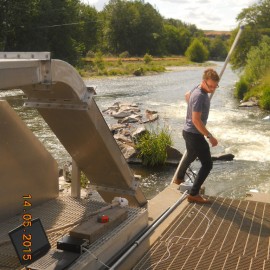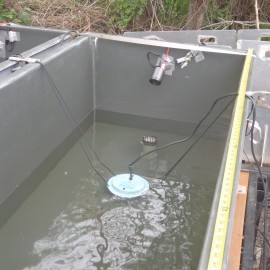Fisheries scientists working with Pacific lamprey (Entosphenus tridentatus) noticed rejection behaviour at a fish pass installed to mitigate for habitat fragmentation. Between ICER and the local fisheries scientists it was hypothesised that this was due to acoustic signals generated by the fish pass in turbulent water. A research project was established in partnership with the United States Geological Survey (USGS) that aimed to improve the passage efficiency of upstream migrating Pacific lamprey. Lamprey passes at various dams along the Umatilla River in Oregon (USA) were mapped for signs of potential acoustic disturbance to migrating lamprey. Captive lamprey were then exposed to the acoustic stimuli under laboratory conditions and their response measured. It is hoped that a better understanding of the acoustic conditions generated at fish passes and the effect this has on migrating lamprey will improve passage efficiency through more informed fish pass deign.
A special thanks to the Confederated Tribes of the Umatilla Indian Reservation for allowing access to their land and Lamprey throughout the running of this project.
Media:
People:
Matt Short
Michael Hayes
Dr. Mary Moser
Prof. Paul Kemp
Prof. Paul White
Prof. Tim Leighton


